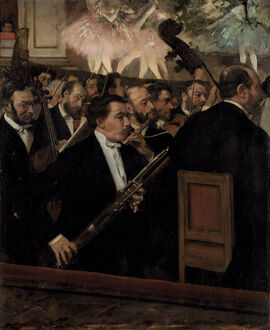
A nineteenth hundredyear waresongband, as meted by the Frenchman Edgar Degas.

West-Eastern Divan Orchestra
Daniel Barenboim leads a Waresongband in Flowmete Two of Beethoven's Ninth Gatherplay.
A Waresongband, or swaygathering, is a great band of gleemen playing on all kinds of songwares. Waresongbands come in manifold spans and ilks, and many well-known song-smiths, among them Bach, Haydn, Mozart, and Beethoven, have written their mightiest works for Waresongbands.
Eretide[]
Nowadays' kind of waresongband can track its eretide back to the Baroque days, when the songs of Vivaldi, Bach, and Handel held sway over all Europe. The first waresongbands had only a handful of string songwares, such as the fiddle and its kin. In the years went on, songwrights at times put in a single wind songware, playing against the strings, in a kind of waresong called a togetherplay. In those days, waresongs were still at the back of most Europeans' minds, as speaksong, but mostly the kind of speaksong heard in the Lord's house, was thought of as by far the greatest kind.
But in time, a new kind of song, the Gatherplay, was written to bring out the best of the waresongband. Soon, not one but many winds and pipes in the waresongband were the mean, and songwrights began casting in horns and drums. At first, few of these were used, since the horns could not hit many pitches, and seldom played as sweetly as they should. But with the making of better horns, the waresongband burst these threshholds. Beethoven led a great overhaul in the way the waresongband was brooked, by writing his greatest and longest songs for it, of which the most well-known are his Third, Fifth, and Ninth Gatherplays. He also added a new songware, the slidehorn, and eked the tally of woodwinds, striking-things, and drums.
Makeup[]
In Beethoven's day, the makeup of the grovekind waresongband was:
Winds: Two blowpipes, two clearpipes, two highwoods, two lowbundles; maybe a littlepipe and underbundle
Brasshorns: Two trumps, two, three, or four Frankish horns, two or three slidehorns
Striking-Things: Two, three, or four bowl-drums, perhaps a lowdrum, snaredrum, threenook, or clashworks
Strings: Many fiddles, underfiddles, great fiddles, and twainlows
The tally of these was not always the same. Fiddles were sundered into First Fiddles and Second Fiddles, each playing a different bit of the song. There were always more strings than any other songwares.
Since Beethoven's time, some waresongbands have gotten bigger, a few of them even growing twofold. Among the new songwares are the underclearpipe, English horn, burrow-horn, harp, chimes, glockenspiel, and hammerbones. Keyboard songwares are also brooked more often; among them are the hammerkeyboard, skycall, and pipestead.